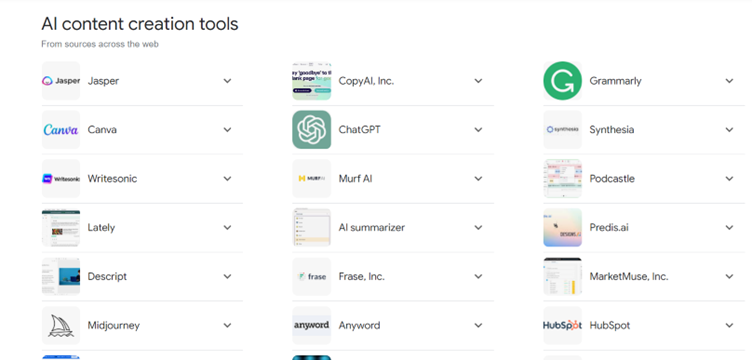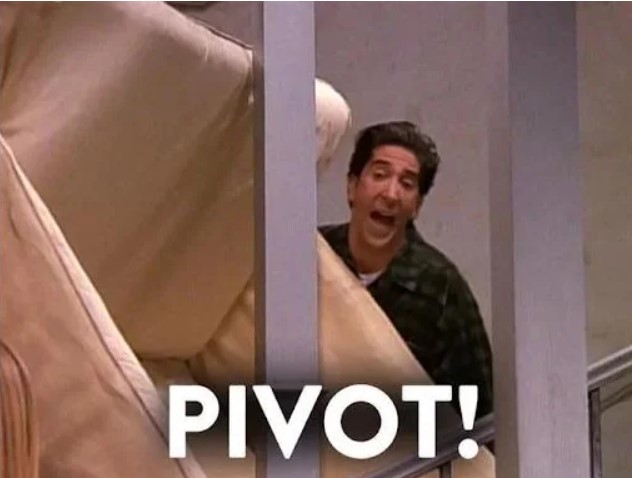AI has the potential to significantly improve efficiency in various job sectors. But, concerns simmer over job displacement, bias, privacy and, in the marketing space, a loss of creative talent. So how can we rationalise AI’s place in our creative marketing agencies? I’m digging into some pros and cons of the double edge sword that is AI.
Here’s What The Experts Say About AI
Let’s kick off with three marketing professionals and their AI insights:
“We want AI to take over mundane research and planning tasks, freeing our creative minds to focus on what we do best. Being creative, witty, engaging and human.”
Niki Nikolaou, Cofounder at Contentworks Agency
“The true power of AI in content marketing lies in its ability to analyze vast amounts of data and uncover insights that would be impossible for humans to detect, enabling more effective and efficient strategies.”
Rand Fishkin, Founder of Moz
“With AI, we can predict trends and consumer behaviors more accurately, ensuring that our content is always relevant and timely, which is crucial for staying ahead in the competitive digital landscape.”
Brian Dean, Founder of Backlinko
Is AI Just A Phase?
In short, no. AI is not just a phase and will continue to develop, becoming smarter, more accurate and less bias over time. Is it overhyped? I think yes somewhat. The label “AI” is on trend right now, so a lot of tools are being labelled as AI when they’re not. For example, we have been utilising tools like automatic content scheduling, chatbots and auto generated social media reports for a decade now. Remember If This Then That (IFTTT) a tool that automated tasks based on pre-set rules? That’s an old one but if launched today it would probably be labelled as an AI tool. Tools like SPSS or Excel use statistical methods, not AI. Software like Tableau and Power BI create visuals from data but don’t inherently use AI. So whilst we see an avalanche of “AI powered tech”, we should keep in mind that we had a lot of it before. It isn’t all new. And therefore it shouldn’t be overwhelming.

The AI Content Marketing Landscape
Let’s cut to the chase. AI content tools are everywhere, and according to a survey by the Content Marketing Institute, 47% of content marketers are currently using AI in some form. 85% of these users believe it improves their content marketing efforts. And it undoubtedly can improve the productivity of a marketing agency. AI-driven tools can increase content creation speed by 200-300%, enabling marketers to produce more content in less time.

AI can also increase the effectiveness of personalised content marketing by 70%, as it enables better targeting and customisation based on user data. Marketers using AI tools see a 50% higher return on investment (ROI) for their content marketing campaigns, compared to those not using AI.
However, AI content is easily recognisable, less branded and much more likely to slide into the oblivion pile on social media. As a content marketing agency director, I create in-depth tone of voice strategies for our clients which help them to stand out in a sea of fierce competition. These align with their brand values, audience, regions, USPs and all that good stuff. AI operates on existing data and patterns. What we’re seeing is formulaic content that lacks the uniqueness and creative spark that human ingenuity provides.
While AI can generate content quickly, it isn’t always accurate, well written, unique or compliant. For clients working in regulated sectors like finance, legal, government or pharmaceuticals, human oversight is essential to ensure quality and relevance. I would argue that AI generated content always needs heavy supervision and editing. But I know that some other marketing agencies distribute it without doing that. We shall agree to disagree.
How AI Can Help Marketing Agencies Thrive
Creative marketing agencies are right to be wary of AI and its impact on their sector. Creatives in the content writing, design, photography, videography, art and music spaces are fiercely guarding their work. And they should be. But AI does offer numerous opportunities for creatives to thrive in the competitive market without sacrificing themselves to the AI machine. Here are some of the ways AI can help creative marketing agencies who still want to be creative.
Enhanced Data Analysis. Data analysis is an essential part of the marketing sphere, but it isn’t a favourite among creatives. Back in 2014 when I was working as a social media manager, I was all about creating amazing campaigns, competitions, gifs and memes. When it was suggested that I also focus on data analysis I think I died a little inside. FFW to 2024 and of course we understand that we need more than just vanity metrics (here’s one I wrote earlier on that). So, isn’t it great news that AI can process vast amounts of data quickly, providing insights that inform more effective marketing strategies. Yes, yes it is!

Efficiency and Automation. AI automates repetitive tasks, freeing up time for creative professionals to focus on more strategic and innovative work. We provide HubSpot management for example. HubSpot uses AI to automate email marketing, social media posting, and customer segmentation. This would take ages to do manually and isn’t a creative flex if we’re honest.
Creative Enhancement. AI tools can enhance the creative process. For example, Adobe’s Sensei uses AI to assist in design by suggesting layout improvements, colour palettes, and even generating design elements, allowing designers to refine and enhance their creative output. Canva also has AI elements as do a lot of design programs. You don’t have to use those tools. Check them out, compare your designs and if you don’t like it, ditch them. AI when overused can really spoil a great design, so creatives must know when to hit the brakes.
As with the example below, I could spot this as an AI very easily and it might be seen as less authentic.

Predictive Analytics. Forecasting trends and outcomes has always been a challenge for businesses, and marketing agencies are no exception. AI can help agencies to make proactive decisions, anticipate market shifts and consumer needs, and enable more strategic planning. This type of predictive analysis will be incorporated into numerous different platforms and applications from banking and investing through to healthcare.
Ad Targeting. Facebook and Google Ads leverage AI to optimise ad targeting. So ads reach the most relevant audiences based on user behaviour and preferences. This increases the effectiveness of ad spend. I don’t know any creatives who would prefer to spend their time doing this. So that’s another marketing task we can offload to AI.
Email Marketing. Platforms like Mailchimp use machine learning to optimise email campaigns, including subject lines, send times, and personalised content, resulting in higher open and conversion rates. As we know, Mailchimp has been around since 2001 and has always had intuitive tools which wouldn’t historically have been labelled as AI.
Soooooo Do We Love AI or Hate It?
Come on now, it isn’t marmite (which I love by the way). AI presents significant challenges and opportunities for creative marketing agencies. While it threatens job security and creative originality, it also offers tools for enhanced efficiency and data-driven strategies.
Platforms and search engines have also recognised the need to label AI content to promote transparency. Any content that contains industry-standard signals that it’s generated by AI will be labelled as “Made with AI” on Meta for example.

For a creative agency extinction to occur, a combination of factors would need to be in place:
- The creative agency doesn’t understand AI or puts off learning it. The client learns it and ditches the agency.
- Agencies use AI in the wrong places. As a creative marketing agency director, I wouldn’t use AI for our creative work. It would certainly show.
- The creative agency pivots too hard towards AI and loses its original agency/client offering.

So, the double edge sword exists, but we can flex it to suit our purposes. Am I right? Tweet me @Charli_Says . For human creativity, get in contact and let’s chat.